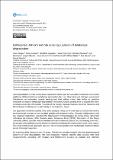| dc.description.abstract | Land degradation in East Africa poses significant challenges to ecosystem resilience and human
wellbeing. While traditional monitoring approaches focus on direct land-use changes, we present
DeltaSense, an innovative remote sensing tool that utilises inland lake deltas as sensitive
indicators of regional landscape degradation. This newly funded project aims to expand the tool's
coverage across the Democratic Republic of the Congo, Uganda, Rwanda, Burundi, Tanzania, and
Mozambique, building upon a pilot study in the Lake Kivu region.
Ourapproachcombinessatellite time series analysis with ground-truth data to detect and monitor
environmental changes across multiple spatial and temporal scales. Through collaboration with
key regional institutions, including the Observatoire Volcanologique de Goma (OVG), Université
catholique de Bukavu (UCB), Rwanda Water Resources Board (RWB), Mountains of the Moon
University (MMU), and the Nelson Mandela-African Institute of Science and Technology (NM-AIST),
the project will establish a comprehensive monitoring network throughout the Great Lakes region.
This multi-institutional approach ensures robust local expertise and sustainable implementation
across the target countries.
By analysing delta dynamics over 40 years, DeltaSense provides insights into the spatiotemporal
patterns of land degradation. The tool integrates multiple satellite data sources with field
measurements, including UAV imagery and bathymetric surveys, to validate and calibrate
degradation assessments. This methodology enables the identification of degradation hotspots
and evaluation of remediation practices.
Initial results from the Lake Kivu region demonstrate the tool's capability to detect various
degradation drivers, including deforestation, agricultural expansion, violent conflicts and mining
activities. The open-source platform facilitates collaboration between researchers, government
agencies, and local communities, promoting evidence-based environmental management
decisions.
This research represents a significant advancement in environmental monitoring by providing
near real-time, actionable data for sustainable resource management. The approach's scalability
and adaptability make it particularly valuable for regions facing similar environmental challenges
globally, with potential applications extending beyond East Africa. | en_US |

